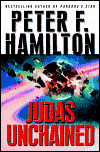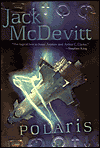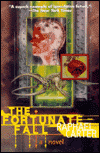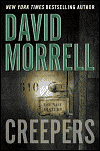
Judas Unchained, by Peter F. Hamilton
Book Review by David Hart
Have you read this book?
This is the continuation of the story begun in Pandora's
Star. No, I don't mean the sequel; "Pandora's Star" was only
the first half of an almost 2000 page novel (I wonder why they didn't
publish it in one volume?). It picks up where we were left: halfway
through an interstellar war, terrorists fighting against alien
subversion, one of the protagonists disappearing over a waterfall.. This
book picks up all those threads and more, and weaves them into a
coherent and satisfying whole.
It's difficult to talk about Judas Unchained alone, so what follows sometimes refers to the novel as a whole. Bad points first: some of the characters keep just happening to come across one another on different planets. The climax is a little contrived, with an over-long chase and a series of will-they/won't-they last minute situations. And the story would have been better if one of the lengthier threads, about the Silfen Paths, had been much shorter.
I've mentioned the novel's length. It seems to be a law of nature that the first 20% of any book must be spent introducing the characters, the situation and the plot; and this is inevitably less exciting than the other 80%. 20% of 2000 pages is a lot! That part of Pandora's Star reads almost as a series of separate stories, most of which seem to be mere background material. Fortunately Hamilton has a good enough writing style that I didn't find this too much of a problem; not even the political intrigues which are usually synonymous with 'dull'. Now in Judas Unchained all these threads, and almost all the characters, are dexterously woven into the main plot. This is what impressed me most about the novel: despite its length, complexity and scope, Hamilton not only fits everything together, but makes it seem effortless.
Characterisation is adequate, though not the book's major strength. The plot is good, but the world-building is first class. The consequences of such things as easy-but-expensive rejuvenation and of memory storage are explored; for example, murder is punished with a real suspended sentence. Travel between inhabited worlds in different star systems is by means of wormholes, but in a stroke of genius Hamilton creates a railway system, with the trains carrying passengers through one or more wormholes to a station on their destination planet. And it's a sign of the richness of the world-building that, despite the size of the book, there are facets that are underplayed: a sentient AI, various other alien species, genetically modified humans...
Who should read this book (and Pandora's Star of course)? Anyone who likes hard-ish SF and is willing to spend the time it takes to get through 2000 well-written pages. If you do, the world-building and the choreography of the story-lines will be your reward.
It's difficult to talk about Judas Unchained alone, so what follows sometimes refers to the novel as a whole. Bad points first: some of the characters keep just happening to come across one another on different planets. The climax is a little contrived, with an over-long chase and a series of will-they/won't-they last minute situations. And the story would have been better if one of the lengthier threads, about the Silfen Paths, had been much shorter.
I've mentioned the novel's length. It seems to be a law of nature that the first 20% of any book must be spent introducing the characters, the situation and the plot; and this is inevitably less exciting than the other 80%. 20% of 2000 pages is a lot! That part of Pandora's Star reads almost as a series of separate stories, most of which seem to be mere background material. Fortunately Hamilton has a good enough writing style that I didn't find this too much of a problem; not even the political intrigues which are usually synonymous with 'dull'. Now in Judas Unchained all these threads, and almost all the characters, are dexterously woven into the main plot. This is what impressed me most about the novel: despite its length, complexity and scope, Hamilton not only fits everything together, but makes it seem effortless.
Characterisation is adequate, though not the book's major strength. The plot is good, but the world-building is first class. The consequences of such things as easy-but-expensive rejuvenation and of memory storage are explored; for example, murder is punished with a real suspended sentence. Travel between inhabited worlds in different star systems is by means of wormholes, but in a stroke of genius Hamilton creates a railway system, with the trains carrying passengers through one or more wormholes to a station on their destination planet. And it's a sign of the richness of the world-building that, despite the size of the book, there are facets that are underplayed: a sentient AI, various other alien species, genetically modified humans...
Who should read this book (and Pandora's Star of course)? Anyone who likes hard-ish SF and is willing to spend the time it takes to get through 2000 well-written pages. If you do, the world-building and the choreography of the story-lines will be your reward.
|
Click here to buy Judas Unchained, by Peter F. Hamilton on Amazon
|
Judas Unchained, by Peter F. Hamilton on Amazon

| More Books You Might Like |
Comment on Judas Unchained, by Peter F. Hamilton
| Comments on Judas Unchained, by Peter F. Hamilton |
| There are no comments on this book. |




